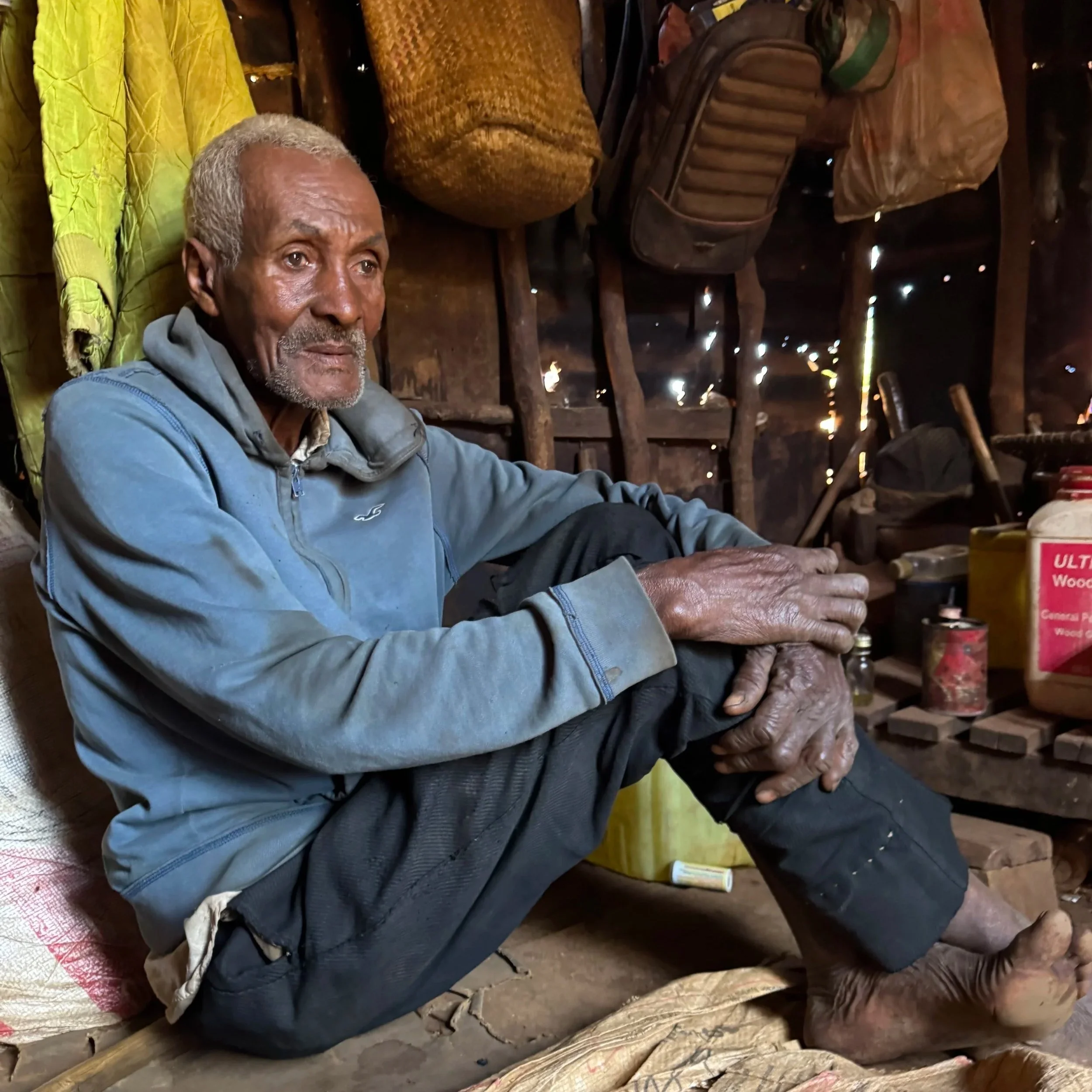Walk with Ancestors
A Malagasy Elder’s Life and Wisdom
Setting the Scene
The afternoon light falls gently across a tiny settlement in northern Madagascar, where several small homes cluster beneath the shade of banana trees. Goats graze lazily on dry grass while chickens dart between the huts. A clothesline strung between banana stalks flutters with sarongs and children’s shirts, marking the rhythm of family life.
In one of these simple homes no larger than 8 x 8 feet, built of sticks and holding just a single room , lives SABOTSY (Zaman’i Zafy), a respected elder and spiritual leader. Nearby, his daughter and grandchildren share another modest dwelling, and together they form a living circle of kinship and continuity.
Here, in a place unknown to much of the outside world, ancestral wisdom is not an echo of the past but a daily companion. And SABOTSY is its custodian.
Meeting the Elder
On this day, interviewer SABITY Rose Amrina, a local Malagasy HUMANCULTURE ambassador dedicated to documenting oral traditions, sits with SABOTSY in the shade of his home. Their conversation drifts between memory and guidance, weaving the story of a man who has lived through decades of change but has never abandoned the ways of his ancestors.
“Life is not easy,” SABOTSY says softly, his hands resting on a worn walking stick. “But it is good, because the ancestors are with us.”
The Role of the Ancestors (Razana)
In Malagasy life, the Razana (the ancestors) are never truly gone. They remain present, guiding, protecting, and shaping every decision.
“The ancestors are not behind us,” SABOTSY explains with quiet certainty. “They are with us, every day. Without them, life has no order.”
Every blessing, every ceremony, every turning point in life begins with honoring the Razana. This is the center of Malagasy tradition.
Blessings Across Generations
Blessings (Jôro) are not confined to sacred rituals. They shape the rhythm of daily life:
Children and education:
“When a child goes to exams, we ask for Jôro. The words give them strength, and the ancestors walk with them.”
Health and protection:
Families call on ancestral blessings during illness or struggle, seeking healing and safety.
Life transitions:
From weddings to funerals, every threshold is crossed with blessings to ensure guidance and peace.
Land and homes:
A new house cannot be built, nor land settled, without invoking ancestral approval.
For SABOTSY, these practices are not just tradition — they are survival.
The Daily Rhythm of Village Life
Life in the settlement unfolds with a balance of simplicity and meaning:
Morning: Children fetch water while women prepare rice on open fires.
Midday: Goats and chickens wander freely as families gather to eat and neighbors exchange news.
Afternoon: Men repair tools or tend to small fields, while elders like SABOTSY share stories of the past.
Evening: Families sit together, telling tales of their ancestors as the day closes.
Each moment carries the imprint of the Razana, linking generations in unseen but powerful ways.
A Journey Through History
SABOTSY was born in Soalala on Madagascar’s western coast but migrated north during the upheaval of the MDRM period (the 1947 uprising against French colonial rule). Like many, he sought survival and stability, a place where his family could live in peace while keeping to ancestral traditions.
Now settled near Diego Suarez (Antsiranana), SABOTSY has become a respected guide for his community. Neighbors call upon him to perform Jôro ceremonies, lead blessings, and share the knowledge of how life was lived before modern influences reshaped village life.
Tradition in a Changing World
While younger Malagasy increasingly move to cities in search of modern life, elders like SABOTSY stand as reminders of continuity.
“If we forget the blessings, we forget who we are,” he warns. “The ancestors will not leave us, but we may leave them. That is the danger.”
His words carry both wisdom and warning: culture survives only when it is practiced, honored, and passed forward.
The Heart of Community: Fihavanana
Underlying all these traditions is Fihavanana, the Malagasy concept of kinship, unity, and harmony. It is both social and spiritual, binding families and neighbors together under the watchful eyes of the ancestors.
Through blessings and rituals, communities maintain balance — not just among themselves, but with the unseen world that holds them.
Why SABOTSY’s Story Matters
SABOTSY’s story reveals a Madagascar few outsiders ever see: a world where tradition is not locked in museums but alive in daily practice. His life is a living testimony to resilience, continuity, and the sacredness of family.
For readers far away, his message is simple yet profound: blessings, ancestors, and community and cultural practices are the very roots of identity.
“Without the ancestors, we have no direction. We do not forget them. Every day, we speak to them.”
Elder SABOTSY (Zaman’i Zafy) in his home


